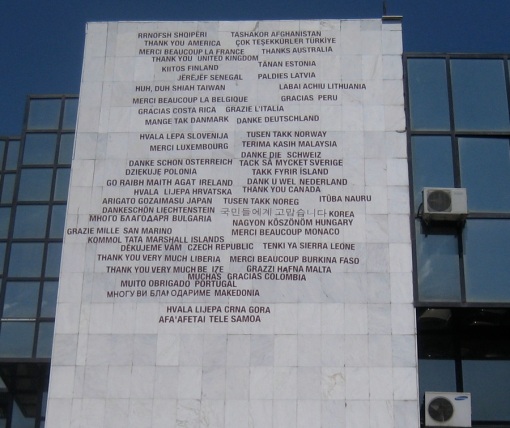Reminded of Kosovo…
The first time I visited Serbia was in February 2008, less than two weeks after Kosovo declared its independence. A few days before my departure, a video clip on the news from Belgrade alarmed my friends and family who knew of my plans: the American Embassy in Serbia was lit on fire by a mob of protesters. Although the protest was largely peaceful for the whole day, at the end a bunch of hooligans got out of hand and torched the embassy. Of course the news in the United States only really showed the embassy on fire without much context, and of course my mother was very worried that in a few days her daughter would go to a country with a burnt American embassy. The visit was wonderful and Serbs, as usual, were extremely hospitable. However, one thing was clear: Serbia was angered by Kosovo’s declaration of independence and they did not want to accept what they considered to be an “unlawful” declaration of independence.
A year later I returned to Serbia for a much longer stay, to take language classes and to truly immerse in the culture. With more time to travel, I finally visited Kosovo much to the dismay and shock of some of my new Serbian friends. A friend and I traveled from Novi Sad, Serbia, to Mitrovica, Kosovo, where Serbs occupy the northern party of the border city. No passports were stamped because Serbia recognized this place as their own, the land of their most prized cultural treasures. Today, two million Albanians and 120,000 Serbs live separately in Kosovo, and Mitrovica clearly exemplifies this ethnic split. The north of Mitrovica is inhabited by Serbs and the south by Albanians, with the two areas separated by barbed wire, some UN stragglers, and a bridge.
A monument spelling “NEWBORN” (in English) stands in the center of Pristina, the capital city. A wall in Prizren, Kosovo thanked the 63 countries, including twenty-three EU member states, which recognize Kosovo’s independence in their own languages. However, 140 of the UN’s 194 members do not recognize Kosovo, including Russia and Spain. Traveling through Kosovo with someone from Spain was an interesting experience. When standing in a Serbian enclave, my friend was personally thanked for his country’s position, and when speaking with Albanians, I was thanked as an American. For Spain, a country struggling with its own separatist movements, this issue is a personal one. Mostly on this trip, I noticed the division and tension in Kosovo, saw indications of years of hardships in destroyed religious buildings, and felt uncomfortable after dark with the barbed wire and armed UN troops on patrol.
Today on December 1, 2009, I am reminded of Kosovo because this day marks the start of the International Court of Justice trial to determine whether Kosovo’s stance is legal. Serbia would like Kosovo to remain an autonomous province, and Kosovo claims that their declaration of independence is “irreversible.” Judges at the ICJ, the U.N.’s highest judicial body, will hear statements from 29 other nations over eight more days, with key testimony from Spain, the United States and Russia expected on December 8. With the hearings expected to take months, and almost two years since Kosovo’s declaration, I have to admit that I agree with Kosovo’s stance: I think their statement of independence is irreversible. With the area populated by an Albanian majority by over 90% and the 1990s still fresh in the minds of all the inhabitants of the Balkans, Kosovo like the NEWBORN statue reflects is beginning to forge ahead to a new future. With the conclusion of these hearings, irregardless of the verdict, I hope Serbia can do the same.



Your blog is very nice! In fact it’s not dangerous at all to travel in the region, much less dangerous than to travel through Western Europe.
Sarah,
You are absolutely right- it’s very safe to travel around East Europe. I meant in this post that when I was in the northern Mitrovica at night, I felt uneasy because of the military presence. However, we had no trouble at all. Thanks a lot for reading and I hope you continue!
Christine
Kosovo paid the price of contradiction, cause they were demanding the right of independence for the Serb minorities in other Republics like Croatia or Bosnia, but they don’t accept it in their own territory.